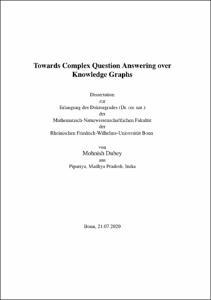Towards Complex Question Answering over Knowledge Graphs

Towards Complex Question Answering over Knowledge Graphs

| dc.contributor.advisor | Lehmann, Jens | |
| dc.contributor.author | Dubey, Mohnish | |
| dc.date.accessioned | 2021-06-02T11:46:23Z | |
| dc.date.available | 2021-06-02T11:46:23Z | |
| dc.date.issued | 02.06.2021 | |
| dc.identifier.uri | https://hdl.handle.net/20.500.11811/9122 | |
| dc.description.abstract | Over the past decade, Knowledge Graphs (KG) have emerged as a prominent repository for storing facts about the world in a linked data architecture. Providing machines with the capability of exploring such Knowledge Graphs and answering natural language questions over them, has been an active area of research. The purpose of this work, is to delve further into the research of retrieving information stored in KGs, based on the natural language questions posed by the user. Knowledge Graph Question Answering (KGQA) aims to produce a concise answer to a user question, such that the user is exempt from using KG vocabulary and overheads of learning a formal query language. Existing KGQA systems have achieved excellent results over Simple Questions, where the information required is limited to a single triple and a single formal query pattern. Our motivation is to improve the performance of KGQA over Complex Questions, where formal query patterns significantly vary, and a single triple is not confining for all the required information. Complex KGQA provides several challenges such as understanding semantics and syntactic structure of questions, Entity Linking, Relation Linking and Answer Representation. Lack of suitable datasets for complex question answering further adds to research gaps. Hence, in this thesis, we focus the research objective of laying the foundations for the advancement of the state-of-the-art for Complex Question Answering over Knowledge Graphs, by providing techniques to solve various challenges and provide resources to fill the research gaps.
First, we propose Normalized Query Structure (NQS), which is a linguistic analyzer module that helps the QA system to detect inputs and intents and the relation between them in the users' question. NQS acts like an intermediate language between natural language questions and formal expressions to ease the process of query formulation for complex questions. We then developed a framework named LC-QuAD to generate large scale question answering dataset by reversing the process of question answering, thereby translating natural language questions from the formal query using intermediate templates. Our goal is to use this framework for high variations in the query patterns and create a large size dataset with minimum human effort. The first version of the dataset consists of 5,000 complex questions. By extending the LC-QuAD framework to support Reified KGs and crowd-sourcing, we published the second version of the dataset as LC-QuAD 2.0, consisting of 30,000 questions with their paraphrases and has higher complexity and new variations in the questions. To overcome the problem of Entity Linking and Relation Linking in KGQA, we develop EARL, a module performing these two tasks as a single joint task for complex question answering. We develop approaches for this module, first by formalizing the task as an instance of the Generalized Traveling Salesman Problem (GTSP) and the second approach uses machine learning to exploit the connection density between nodes in the Knowledge Graph. Lastly, we create another large scale dataset to answer verbalization and provide results for multiple baseline systems on it. The Verbalization dataset is introduced to make the system's response more human-like.The NQS based KGQA system was next to the best system in terms of accuracy on the QALD-5 dataset. We empirically prove that NQS is robust to tackle paraphrases of the questions. EARL achieves the state of the art results in Entity Linking and Relation Linking for question answering on several KGQA datasets. The dataset curated in this thesis has helped the research community to move forward in the direction of improving the accuracy of complex question answering as a task as other researchers too developed several KGQA systems and modules around these published datasets. With the large-scale datasets, we have encouraged the use of large scale machine learning, deep learning and emergence of new techniques to advance the state-of-the-art in complex question answering over knowledge graphs. We further developed core components for the KGQA pipeline to overcome the challenges of Question Understanding, Entity-Relation Linking and Answer Verbalization and thus achieve our research objective. All the proposed approaches mentioned in this thesis and the published resources are available at https://github.com/AskNowQA and are released under the umbrella project AskNow. | en |
| dc.language.iso | eng | |
| dc.rights | In Copyright | |
| dc.rights.uri | http://rightsstatements.org/vocab/InC/1.0/ | |
| dc.subject.ddc | 004 Informatik | |
| dc.title | Towards Complex Question Answering over Knowledge Graphs | |
| dc.type | Dissertation oder Habilitation | |
| dc.publisher.name | Universitäts- und Landesbibliothek Bonn | |
| dc.publisher.location | Bonn | |
| dc.rights.accessRights | openAccess | |
| dc.identifier.urn | https://nbn-resolving.org/urn:nbn:de:hbz:5-62401 | |
| ulbbn.pubtype | Erstveröffentlichung | |
| ulbbnediss.affiliation.name | Rheinische Friedrich-Wilhelms-Universität Bonn | |
| ulbbnediss.affiliation.location | Bonn | |
| ulbbnediss.thesis.level | Dissertation | |
| ulbbnediss.dissID | 6240 | |
| ulbbnediss.date.accepted | 19.01.2021 | |
| ulbbnediss.institute | Mathematisch-Naturwissenschaftliche Fakultät : Fachgruppe Informatik / Institut für Informatik | |
| ulbbnediss.fakultaet | Mathematisch-Naturwissenschaftliche Fakultät | |
| dc.contributor.coReferee | Auer, Sören | |
| ulbbnediss.contributor.gnd | 1236078047 |
Dateien zu dieser Ressource
Das Dokument erscheint in:
-
E-Dissertationen (4462)




